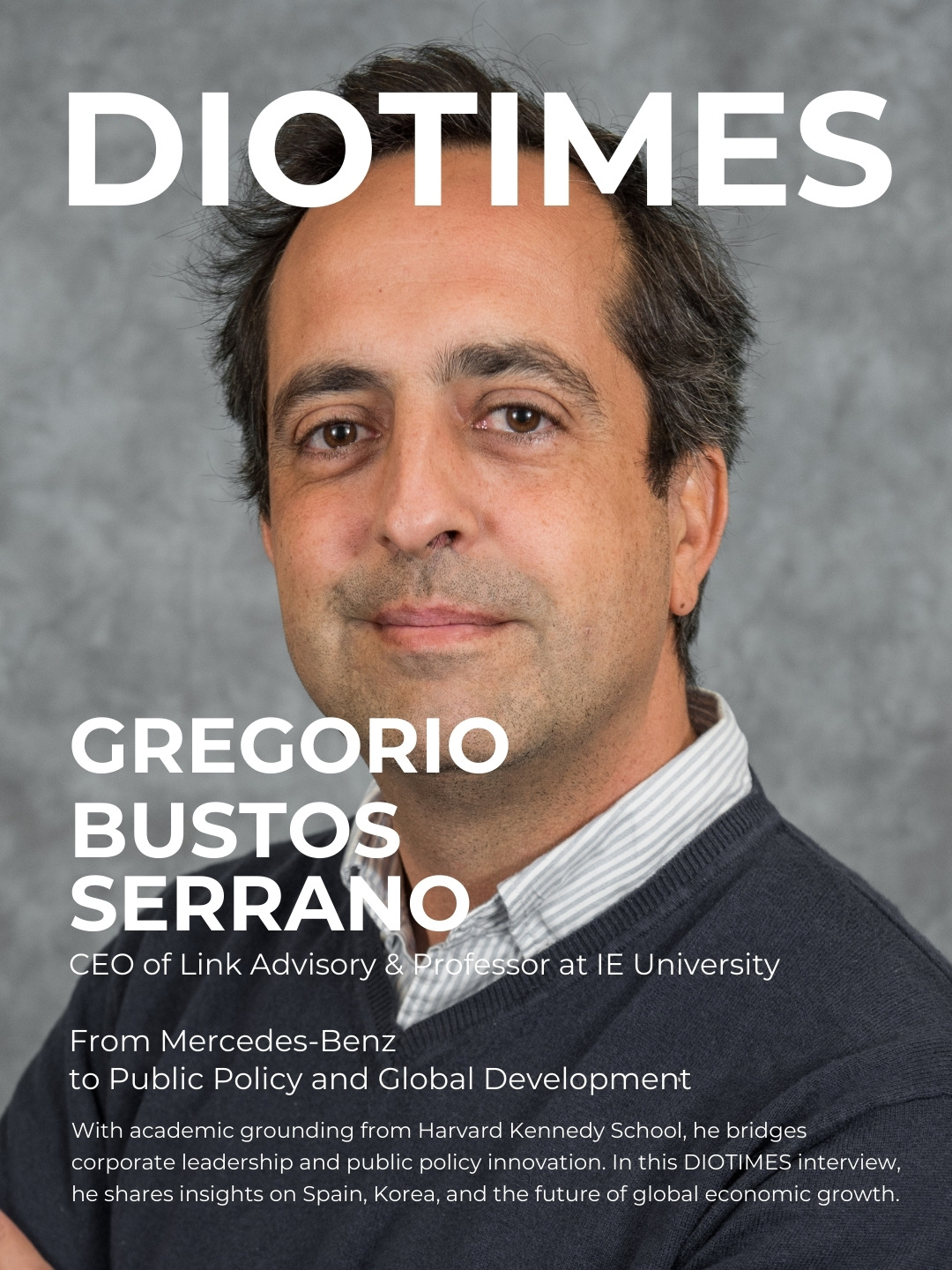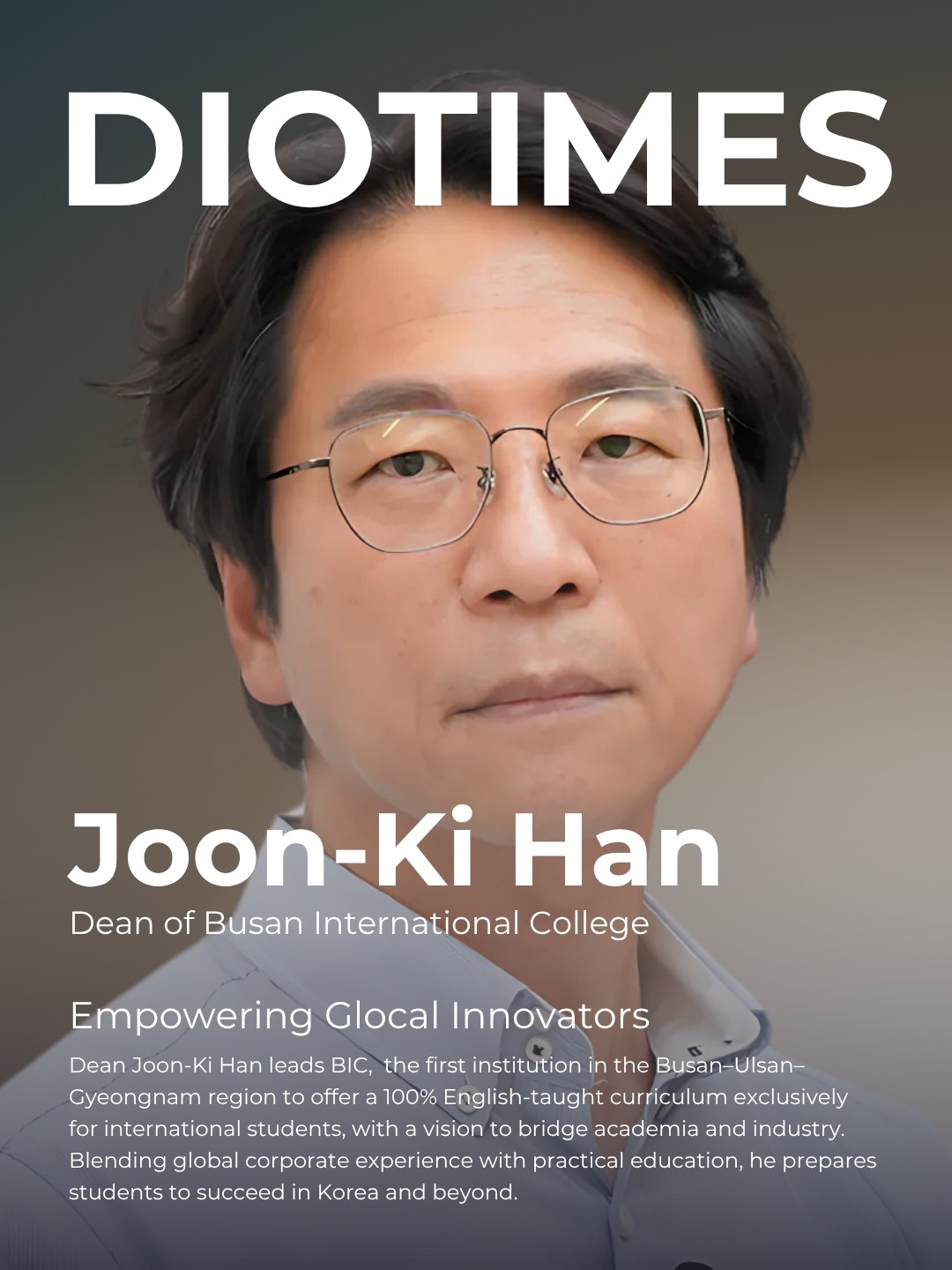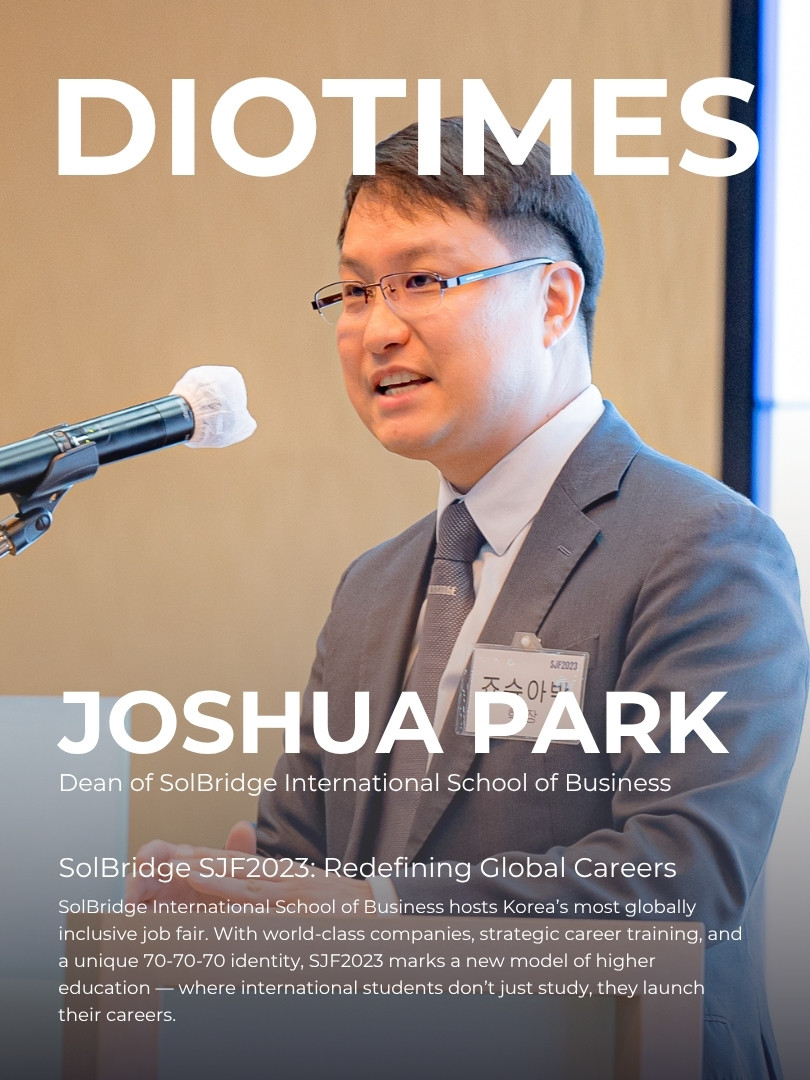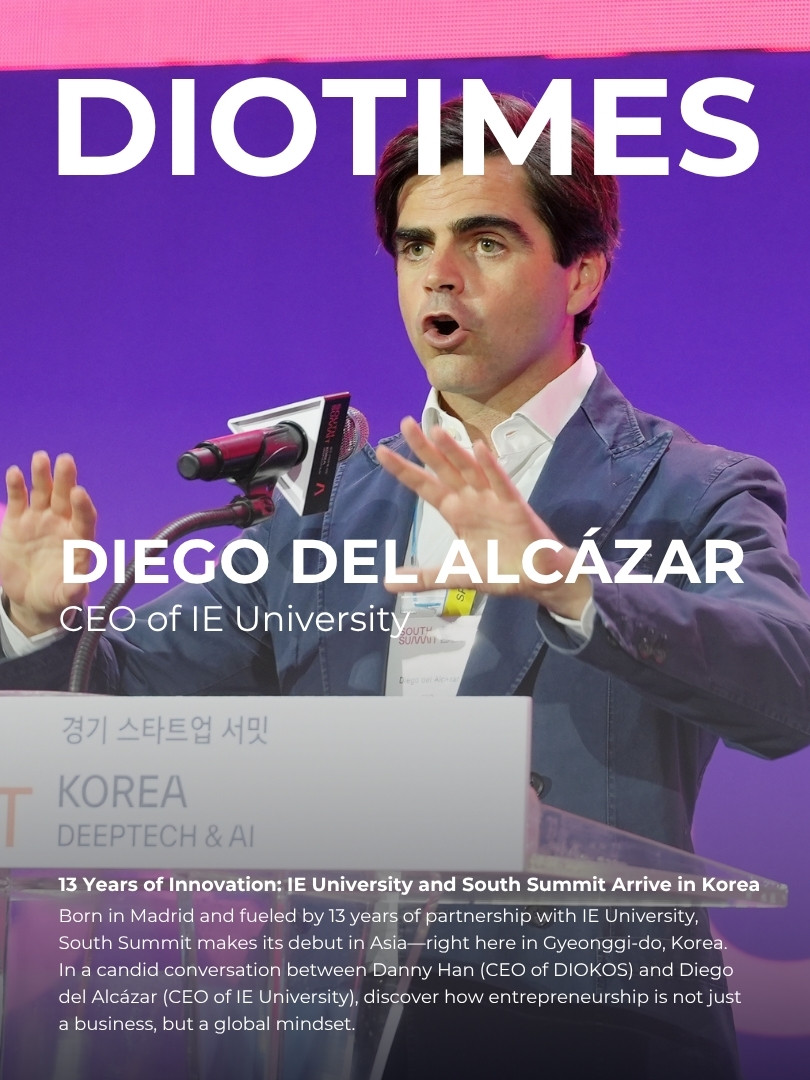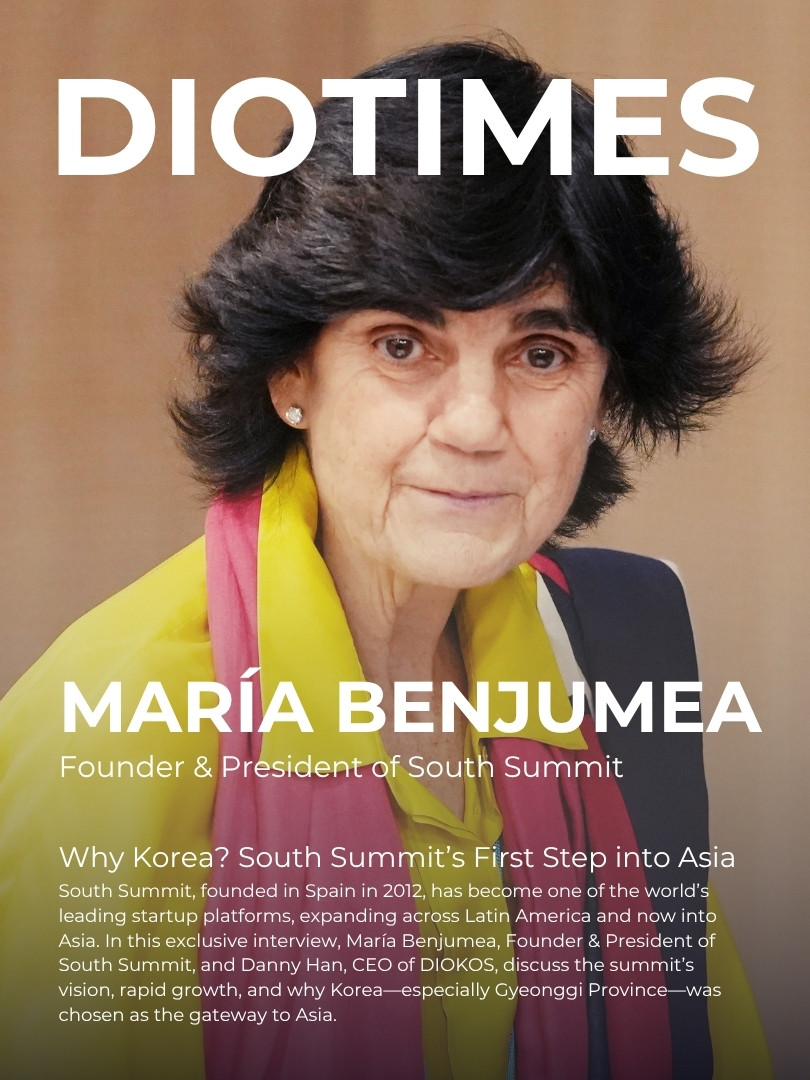GREGORIO BUSTOS SERRANO
At DIOTIMES, we are committed to bringing our readers the voices and visions of leaders who shape global business, policy, and society. In this special feature, we present an in-depth conversation with Professor Gregorio Bustos Serrano, CEO of Link Advisory and Professor at IE University in Madrid. With more than two decades of leadership experience at Mercedes-Benz, academic work at Harvard Kennedy School, and ongoing contributions to public consultancy, Professor Bustos Serrano embodies the intersection of corporate expertise and public-policy innovation.
This interview explores his professional journey, the lessons he has drawn from guiding multinational organizations, and his perspectives on global economic development, Spain–Korea cooperation, and the values he seeks to instill in the next generation of leaders.
Could you please introduce your current roles as CEO of Link Advisory Public Consultancy and Professor at IE University?
After a switch in my professional career, I co-founded Link Advisory, a boutique consultancy that provides services to local and national governments on how to achieve major economic and social development. In addition, I teach international economics and politics at the School of Politics, Economics and Global Affairs at IE University in Madrid. I enjoy very much teaching a diverse group of international students, including many from Korea and other Asian countries.
You held various leadership positions, including CFO, at Mercedes-Benz for over 20 years. What was the most important lesson you learned from those experiences?
Mercedes-Benz has been my professional home for many years. Learning from an organization that has a global presence and has been so successful for more than 130 years is impressive. My main takeaway is that multinational organizations are the main actors in the process of globalization, bringing their products and services to citizens around the world. Another lesson is that competition is fierce; companies must reinvent themselves daily. The success of yesterday disappears quickly, and companies must continuously become more efficient and adapt to market changes rapidly.
How did your career in multinational corporations influence your current work in public policy and economic development?
My great advantage is that I know in depth how these major industries and organizations work: how they plan their resources, how they expand their businesses, how they survive crises, and also how they can impact countries and regions on their path to economic and social progress. Many times, the worlds of public policy and private companies do not understand each other. I can play a perfect bridge between them.
At Harvard Kennedy School, you studied the concept of Economic Complexity. How can this approach be applied to national development strategies or corporate management in practice?
During my time at Harvard Kennedy School, one of my key learnings was to understand the concept of Economic Complexity. Through that concept, one can easily see how countries are based on economic sectors that are more or less complex; therefore, economic complexity is a great predictor of how countries will grow in the future in a sustainable manner. For corporate management, the concept helps to identify which products are more complex and how to develop them.
Having led national initiatives such as “Spain 2030” and the “Cambridge Manifesto on Spanish Science,” what key lessons did you take away from those experiences?
I was very active during my time in Boston in applying some of the concepts learned at Harvard and proposing strategic ideas to be implemented in Spain. The proposals were welcomed by the scientific community in Spain, but they did not succeed at the political level. Nevertheless, Spain must undergo a major economic transformation, and those plans are still valid today.
With your experience across both European and Asian markets, what do you see as the greatest opportunities and risks in global finance and economic development going forward?
I believe that the world is going through a minor reshaping: the globalization process will continue, and the strength of democratic values and market economies has proven to be the most successful recipe for human progress.
Among the greatest opportunities, I see new regions and countries that can finally embrace economic and social progress. For example, many countries in South America and Africa already represent the next economic champions and therefore great opportunities for Asian and European companies.
In terms of Europe, I believe that the European Union represents a great success in terms of political stability and social and economic development (for example, Spain or many Eastern European countries). I foresee major global trade openness after this period of adjustment. Europe and Asian countries must continue to trade and open their economies for mutual benefit.
What strategic choices do you believe emerging advanced economies need to make in order to achieve sustainable growth on the global stage?
Most economic success stories are based on two to three major economic sectors (for example, automotive and tourism in Spain). Emerging advanced economies must bet on several sectors to transition to the next level of complexity, taking advantage of their existing strengths. For example, the automotive sector is transitioning to electric vehicles, which provides great opportunities for those countries able to adapt to these new global value chains.
In your view, what are the most critical challenges Spain must address to strengthen its position in the international economy?
Spain has an economic model mainly based on automotive and tourism (both account for around 20% of GDP). In order to strengthen its economic position, Spain must invest in and promote sectors with higher complexity and become a global reference in science and advanced technology. Spain is a great country to live in and to attract global talent, but the administration and political focus are still concentrated on national issues. Spain needs more political leaders capable of piloting the country toward major economic and global success.
What opportunities do you see for economic and business cooperation between Spain and Korea?
Spain and Korea have many similarities: population size, economic size, and automotive industry. To some extent, both countries are also young democracies that have achieved major success in economic and social terms. I see opportunities for Korean companies to enter the European markets through Spain, making use of the industrial base that has been developed in specific sectors. Spain has access to qualified labor that is lacking in other European countries.
Spain also has excellent universities that attract an impressive number of international students. At the same time, Spanish students show great interest in learning about and studying in Korea. Other areas of cooperation include the food industry: Spain is the largest producer of organic agricultural products, which would be very attractive for the Korean market.
What should Korean companies be most mindful of when entering the Spanish or broader European market?
Spain is very competitive in specific sectors: banking, automotive, construction, and tourism, among others. Korean companies can easily find reliable partners in Spain to develop business and then expand into the European markets. In addition, Spanish companies have an important presence in South America, which can also represent a major opportunity for Korean firms.
What insights from Spain’s economic development experience could be most useful for Korean businesses and policymakers?
Spain has been successful in its first economic and social transformation, evolving from an isolated and underdeveloped society in the 1950s–70s. Joining the European Union was a key step to consolidate that success. Beyond the economy, Spain has been able to foster a distinctive social way of life and culture, which represents an interesting model for a successful individual life—for example, a guaranteed universal healthcare system, a solid education system, and an intelligent immigration policy to integrate foreign citizens. The European Union model should be expanded beyond its geographical boundaries. I can foresee a major union of countries that believe in democratic values and economic openness.
As a professor at IE University, what values or principles do you emphasize most when teaching your students?
I love teaching and getting to know my students on an individual level. I like to challenge them and make the teaching experience memorable. I am very interested in hearing their perspectives on the issues we discuss in class. I strongly emphasize creativity and thinking outside the box.
What advice would you give to students pursuing studies in international finance and economic development?
I believe that having the skills to understand how the world works is a major discovery, and understanding international finance and economics is part of that journey. The world is becoming more integrated, and economic and financial integration is at the core of that process.
Having built a career in both public policy and corporate finance, what key capabilities do you believe young professionals must develop to become global leaders?
To become a global leader, first you must try to understand the world itself. Be prepared to live, study, and work in as many different regions of the world as possible. Understanding how the economic and financial world works is critical. Learning languages and understanding cultural aspects are also key. And finally, as a global leader, you must have a vision of how you want the world to become better, and make that vision your life project.
Throughout your career, has there been a person or book that has most inspired you?
As a university student I read The Machine That Changed the World, about how the automotive industry started and developed to become the economic pillar of many modern societies. I also read publications from Dani Rodrik, who has worked to help us understand how societies are transforming to the next stage of social development. Finally, I subscribe to Project Syndicate, where many intellectual and academic figures write about current political and economic issues.
How do you personally maintain balance between your professional responsibilities and your private life?
In this new period of my life, I can easily combine different professional activities with my personal hobbies. I am active in sports (soccer, paddle), and I also manage the family wine business. By the way, I would love to bring our latest rosé wine to the Korean market (www.wanderingracerose.com). Anyone interested?
Looking ahead, what personal goals or contributions to society would you most like to achieve?
I would definitely like to continue teaching and helping my students become the future leaders of the world. I enjoy that very much. I would also like to contribute to my country one day by participating in national politics and bringing ideas to make the world a better place.


